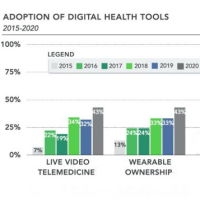A new research assesses the role digital providers play in the mental health support during the pandemic.
You might also like:ATA & ORCHA Partner for Health App Quality
Mental health had been on the radar of the World Health Organization even before COVID-19, with an estimated 1 billion people worldwide suffering from a mental health disorder, and depression emerging as the future leading cause of disease burden globally. In the past year, the populations, and particularly healthcare workers’, mental health and well-being has become one of the fast-growing concerns, exacerbated by COVID-19. The study, led by Dr Becky Inkster from the University of Cambridge, provides a proof-of-concept “of the viability for researchers and private companies to work collaboratively toward a common good” addressing the today’s challenges in mental healthcare (Inkster et al. 2021).
The study has collected information from digital providers based in more than 20 countries. It involved private patient-to-clinician platforms, mental health and well-being apps, chatbots, as well as non-health sources, such as financial services providers, and others. The preliminary results have been published in Frontiers in Digital Health.
The researchers issued an online call for support, to which 53 providers eventually responded including 46 providing digital mental health services. They all selected, analysed and submitted information with no predefined systemic framework, e.g. the type of data or research hypotheses. The authors, therefore, avoid drawing any specific conclusions and note that all their findings are illustrative. While the authors acknowledge this heterogeneity of data has its drawbacks, they emphasise that their study may be viewed as a first stepping stone of future, more structured research.
The participating providers reported a diverse range of mental health-related concerns. Some of them are:
- a growing user demand for information about mental health and well-being, e.g. an increase in searches for relevant apps or local organisations, or greater amount of forum discussions.
- increasing volumes of mental health-related issues reported by users, such as experiencing anxiety, loneliness, abuse, or suicidal ideation.
- more users reaching out for support, e.g. via (tele)consultations with professionals, participation in therapies, or engaging with peer support networks.
- growing feeling of disturbance due to financial insecurity during the pandemic.
The
authors intend to continue their work with providers to get a deeper insight
into the development of mental health-related issues. They underscore that the
scope of this effort should be widened and include more information sources to
ensure more structured and up-to-date monitoring and analysis of the global mental
health. “This can fuel research and understanding and help to inform
high-quality responses, which can be delivered remotely to those in need on
global and local scales,” they conclude.
Image
credit: mixetto
via iStock



























